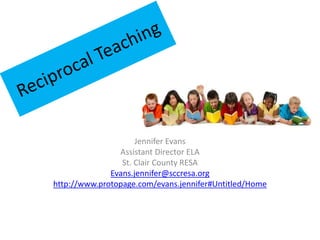
Reciprocal teaching day 1
- 1. Jennifer Evans Assistant Director ELA St. Clair County RESA Evans.jennifer@sccresa.org http://www.protopage.com/evans.jennifer#Untitled/Home
- 2. Agenda Why Use Reciprocal Teaching? What is Reciprocal Teaching? How Do You Do Reciprocal Teaching? Reciprocal Teaching PD Plan Planning Lessons With Reciprocal Teaching evans.jennifer@sccresa.org
- 5. Why use Reciprocal Teaching? Reciprocal teaching enables students to construct meaning and to self-monitor as they read. Reciprocal teaching is in the top 10 most effective strategies. (Hattie 2012) Metacognition is our goal, and reciprocal teaching does this. After 15–20 days of instruction, Palincsar and Brown (1984) saw students go from scoring 30% to scoring 80% on a reading comprehension assessment. • After 76 lessons, students improved by one to two reading levels (Cooper,Boschken, McWilliams, & Pistochini, 2000).
- 7. Too Much Teacher Talk? • 93.31% (1074 discussions) were completely monologic (teacher- centered) in nature • Of the 6.69% (77) that included “dialogic episodes” (moments when students directed the conversation), those episodes lasted for an average of 15 seconds (Nystrand et al., 2003) In one study of 1,151 classroom discussions:
- 8. “Students in classrooms with high academic demands and more emphasis on discussion-based approaches show higher end-of- year literacy performance.” (Applebee et al., 2003, p. 717)
- 9. Reciprocal Teaching Reciprocal Teaching is a dialogue between teacher and students using four strategies: Generating Questions Directs reader to specific information Forces reader to reprocess and manipulate text Summarizing Helps reader focus on pertinent information Focuses active involvement of reader Clarifying Directs reader to look for confusing parts of the text Helps reader decide which “fix up” strategy to use Predicting Forces reader to read with anticipation Causes reader to look for clues indicating where the author is headed
- 10. The Four Foundations: Think-Alouds Cooperative Learning Scaffolding Metacognition
- 11. Modeling How to Guide The Discussion • http://www.readingrockets.org/strategies/reci procal_teaching (2 min. intro)
- 12. Upper Elementary Example • https://www.youtube.com/watch?v=8oXskcnb 4RA (7 min. upper el part 1) • https://www.youtube.com/watch?v=e8gSIcSy ypk (7 min. upper el part 2)
- 13. Lower Elementary Example • https://www.youtube.com/watch?v=Jm4mSV XDCjE (7 min. primary with Fab 4)
- 20. Blooms Flipbook
- 22. Protocol: Give One, Get One What • Inclusion activity • Opener (for day, class period, etc.) • Practice working with each one of the four parts of reciprocal teaching Why • Builds community • Gets everyone’s voice in the room • Sets the norm for respectful listening • Engagement / Accountability • Formative Assessment How • On the Give One, Get One sheet, write down answers to the question below. Be prepared to share your ideas. Discuss with your group how you could use the Bloom’s flipbook in your classroom.
- 24. No one best way to begin using reciprocal teaching in your classroom exists. The key is to regularly model and practice the strategies with your students. Some teachers begin with whole-class sessions, while others prefer a guided reading setting. Some intermediate -grade teachers use reciprocal teaching in a guided reading setting with struggling readers and with the whole class during content area reading. Primary- grade teachers may use reciprocal teaching with Big Books and in guided reading groups. Later, when students in grades 2–8 know how the strategies work together, teachers can introduce literature circles. What is the best way to get started with reciprocal teaching?
- 26. How will I implement Reciprocal Teaching? Take a moment to read through the lesson strategy instruction handouts. Think about how you could implement or deepen your teaching of Reciprocal Teaching into your instruction on a regular basis. How you will monitor your students’ progression? Share your plan with a partner.
- 27. Review Define each of the four reciprocal teaching strategies. What are the four foundations that underpin reciprocal teaching lessons? Why is reciprocal teaching important?
- 28. • Activate Prior Knowledge – Review the reciprocal teaching strategies. – Review prior knowledge of content. • Before Reading – Predict. – Question or wonder. • During Reading – Have students look for words and/or ideas to clarify. – Coach individual students in any of the four reciprocal teaching strategies. • After Reading – Clarify—discuss. – Return to original predictions. – Question—ask quiz or teacher questions. – Summarize. Describe what the teacher does during each part of the Guided Reading lesson.
- 30. Reciprocal Teaching PD Plan Day 1: Introduce the Reciprocal Teaching Strategy (Today) Day 2: Model Lesson using Reciprocal Teaching / Debrief (January 26, 2015) Day 3: Observe / Support you teaching a lesson using the Reciprocal Teaching Strategy (February 23, 2015)
- 31. Questions?
Hinweis der Redaktion
- P 266-267 Appendix C
- Point out to ask students to “prove it” or explain “why” using evidence to support their answers
- Project Life example
- Project Life example
- Online resources
- Once ideas are shared, have participants find a partner, Give one idea (partner writes it down on the “GET ONE” side, if it is not on their sheet); both share one idea Rotate to a new partner and repeat (visit with at least 3 different partners)
- This is a good resource to use when students are practicing each of the 4 pillars independently